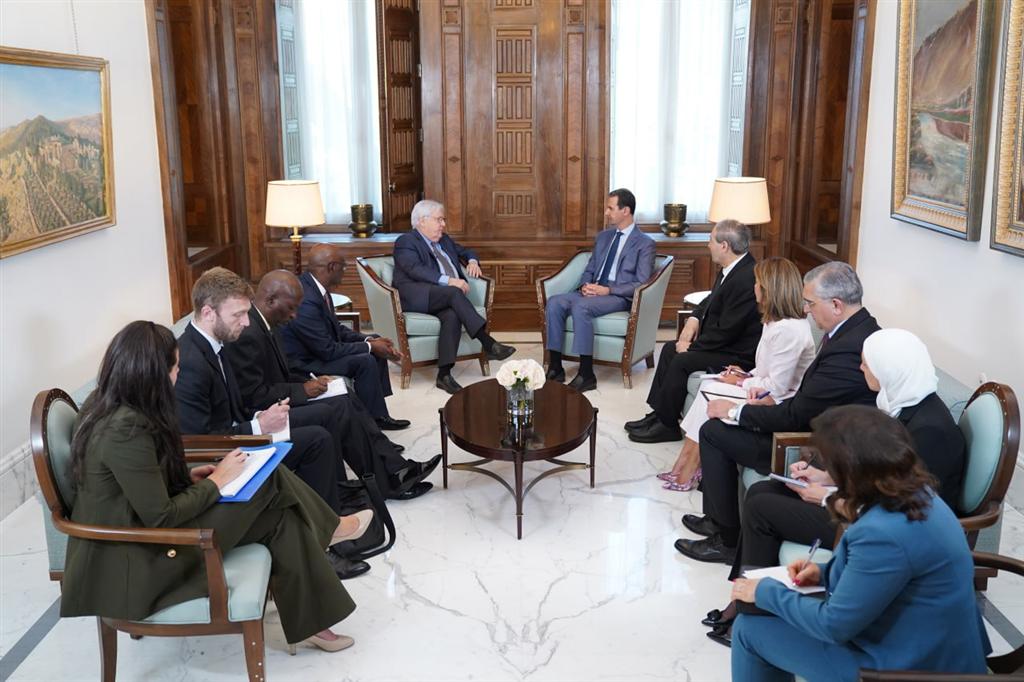The safe return of the displaced is a paramount goal of the Syrian state, Al-Assad said during his reception to Martin Griffiths, the Under-Secretary-General for the United Nations Office for the Coordination of Humanitarian Affairs (OCHA).
He added that this process requires the reconstruction of damaged structures in the towns and cities to which these people are going to return, in addition to the rehabilitation of service facilities and implementing early recovery projects.
The ruler stressed that Syrian state institutions have taken many measures to ease this return and are working to ensure services within available capacities.
Responding to the same issue, Griffiths presented to President Al-Assad, OCHA’s action plan for the next stage, aimed at supporting early recovery projects in Syria and mobilizing efforts to help ensure the right conditions for the return of the refugees.
The Syrian Minister of Foreign Affairs, Faisal Al-Mekdad, reviewed with Griffiths the progress achieved thanks to the cooperation between Syria and the United Nations humanitarian agencies.
He stressed the importance of stopping the politicization of the humanitarian process and complying with UN resolutions which emphasize the need to respect the sovereignty, independence and territorial integrity of states.
The Syrian Minister of Municipal Administration, Hussein Makhlouf, revealed that the number of displaced Syrians who returned to their homes in 2018 amounted to 2.5 million, for a total of six million since 2011.
jrr/llp/lam/fm
Siria pide no politizar el retorno de refugiados
Damasco, 27 jun (Prensa Latina) El mandatario sirio, Bashar Al-Assad, instó a no politizar el expediente del retorno de los desplazados a sus localidades de las que fueron deportados a consecuencia de la guerra y el terrorismo.
El regreso seguro de los desplazados es una meta suprema del Estado sirio, dijo Al-Assad durante su recibimiento a Martin Griffiths, el secretario general adjunto de Asuntos Humanitarios y Coordinador del Socorro de Emergencia de las Naciones Unidas (OCHA, por sus siglas en inglés).
Agregó que este proceso requiere la reconstrucción de las estructuras dañadas en los pueblos y ciudades hacia donde van a retornar estas personas, además de la rehabilitación de las instalaciones de servicio e implementar proyectos de recuperación temprana.
El gobernante destacó que las instituciones estatales sirias han tomado muchas medidas para facilitar este regreso y están trabajando para asegurar servicios dentro de las capacidades disponibles.
Griffiths, por su parte, presentó al presidente Al-Assad el plan de acción de la organización internacional para la próxima etapa con el fin de apoyar los proyectos de recuperación temprana en Siria y movilizar los esfuerzos para ayudar a garantizar las condiciones adecuadas para el regreso de los refugiados.
En el mismo contexto, el ministro sirio de Asuntos Exteriores, Faisal Al-Mekdad, repasó con Griffiths los avances que se han logrado gracias a la cooperación entre Siria y las agencias humanitarias de Naciones Unidas.
Destacó la importancia de detener la politización del expediente humanitario y cumplir las resoluciones de la ONU que enfatizan la necesidad de respetar la soberanía, la independencia y la integridad territorial de los estados.
El ministro sirio de Administración Municipal, Hussein Makhlouf, reveló que el número de desplazados sirios que retornaron a sus hogares desde 2018 ascendió a 2.5 millones, para un total de seis millones desde 2011.









